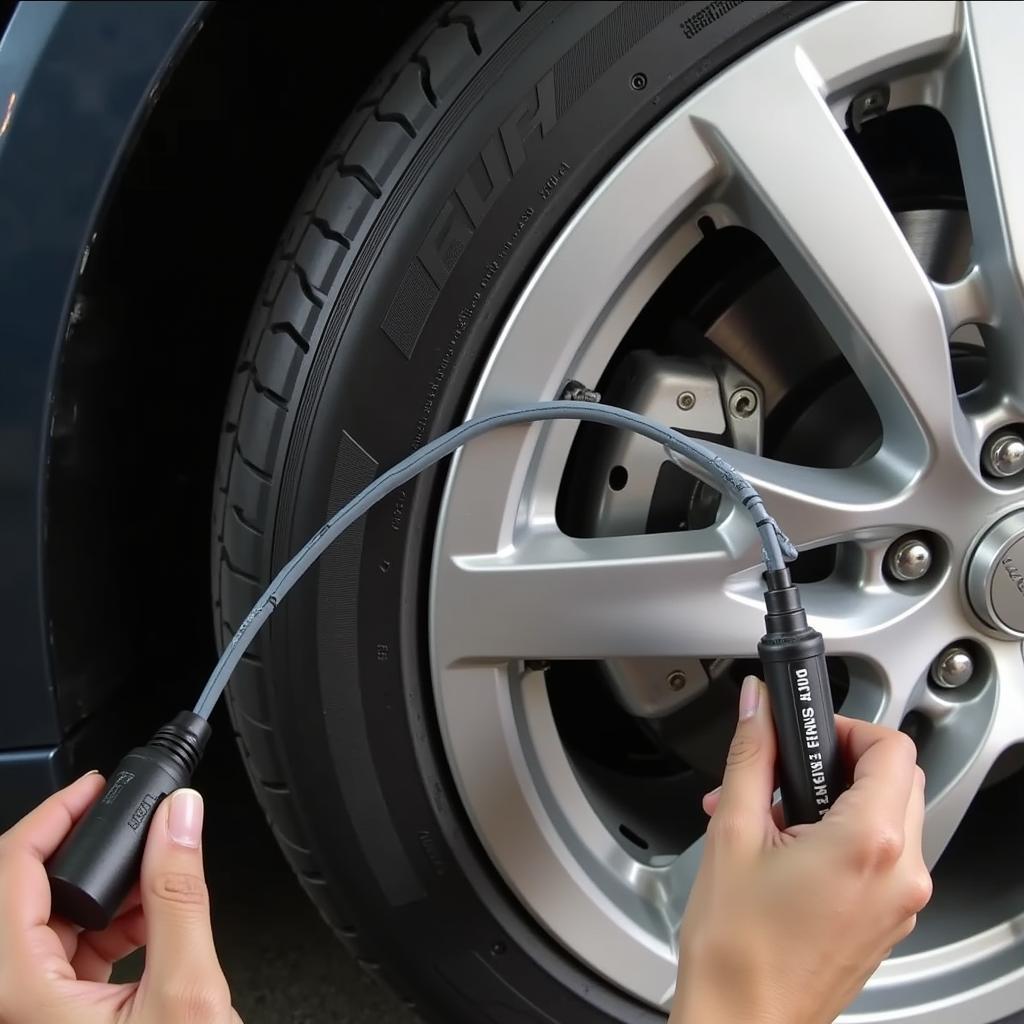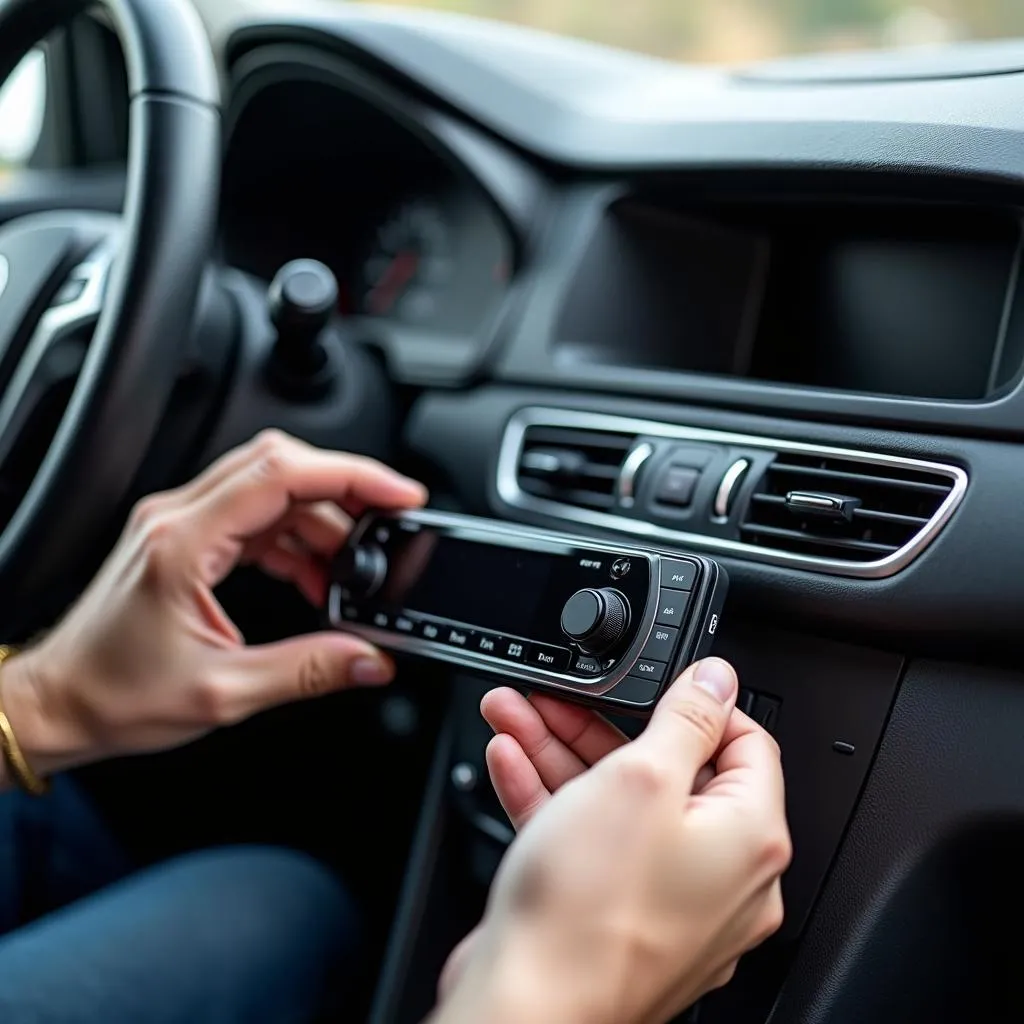The dreaded brake warning light on your BMW dashboard can be a cause for concern. Whether it’s a persistent glow or an intermittent flicker, understanding why the BMW brake warning light stays on is crucial for your safety and the longevity of your vehicle. This comprehensive guide delves into the common causes of this issue and provides you with the knowledge to address them effectively.
Understanding Your BMW Brake Warning Light
Before we jump into the causes, it’s essential to understand what triggers your BMW brake warning light. This light is part of your car’s intricate braking system, designed to alert you of potential issues. While it might seem alarming, the light itself doesn’t always signify a major problem. It could be something as simple as low brake fluid or a worn brake pad. However, ignoring this warning could lead to more serious and costly repairs down the line.
Common Causes of a BMW Brake Warning Light Staying On
There are several reasons why your BMW brake warning light might stay illuminated. Here are some of the most common culprits:
1. Low Brake Fluid
Brake fluid is the lifeblood of your BMW’s braking system. It’s a hydraulic fluid that transmits the force from your foot on the brake pedal to the brake calipers, which then squeeze the brake pads against the rotors, slowing or stopping your vehicle.
Over time, brake fluid can become contaminated with moisture, which can reduce its effectiveness and trigger the warning light. Additionally, a leak in the brake lines can cause the fluid level to drop, leading to the same warning.
Expert Insight: “One of the most frequent causes of a persistent brake warning light is low brake fluid. It’s essential to have your brake fluid levels checked regularly and topped up or replaced as needed,” says Jake Carter, a seasoned BMW mechanic with over 15 years of experience.
2. Worn Brake Pads
Your BMW’s brake pads are designed to wear down over time. They’re the components that create friction against the brake rotors to slow or stop your vehicle. As you use your brakes, the friction material on the pads gradually wears away.
Most BMWs are equipped with a brake pad wear sensor. When the pads reach a certain level of wear, the sensor triggers the brake warning light on your dashboard, indicating it’s time for a replacement.
3. Faulty Brake Pad Sensor
While designed for durability, the brake pad wear sensor itself can malfunction. A short circuit, broken wire, or corrosion can cause the sensor to send a false signal to the car’s computer, illuminating the brake warning light even if the brake pads are in good condition.
4. ABS Issues
Your BMW’s Anti-lock Braking System (ABS) is a vital safety feature that prevents the wheels from locking up during hard braking. The system uses sensors to monitor wheel speed and modulate brake pressure, preventing skids and maintaining control.
A malfunctioning ABS module, faulty wheel speed sensors, or issues within the ABS system can trigger the brake warning light.
 Close-up of ABS Sensor
Close-up of ABS Sensor
5. Other Potential Causes
Beyond these common causes, other less frequent issues can also illuminate the brake warning light:
- Faulty brake light switch: This switch activates your brake lights when you press the brake pedal. A malfunctioning switch can confuse the car’s computer, leading to a false brake warning.
- Electrical problems: Issues with wiring, connectors, or the instrument cluster itself can cause various warning lights to behave erratically, including the brake warning light.
- Software glitches: Modern BMWs rely heavily on software. Occasionally, software glitches within the braking system can trigger false warnings.
What to Do When Your BMW Brake Warning Light Stays On
If your BMW’s brake warning light stays on, it’s crucial to take action promptly. Here’s what you should do:
- Check your brake fluid level. This is a simple check you can do yourself by locating the brake fluid reservoir under the hood of your car.
- Inspect your brake pads. If you’re comfortable doing so, you can visually inspect your brake pads for wear. Look for a thin layer of friction material or exposed metal.
- Avoid driving long distances. If the brake warning light is on, it’s best to avoid driving long distances until you’ve identified and addressed the root cause.
- Schedule a professional inspection. The safest and most reliable way to diagnose and fix the problem is to take your BMW to a qualified mechanic specializing in BMW repairs. They have the expertise, tools, and diagnostic equipment to pinpoint the exact issue and perform the necessary repairs.
Expert Insight: “Ignoring a brake warning light can have serious consequences. It’s always best to err on the side of caution and have your BMW inspected by a professional as soon as possible,” advises Jake Carter.
Preventative Measures to Avoid Brake Warning Light Issues
Prevention is always better than cure. Here are some preventative measures to help avoid brake warning light issues in the future:
- Regular Maintenance: Adhere to your BMW’s recommended maintenance schedule. This includes regular brake inspections, fluid flushes, and part replacements.
- Quality Parts: Always opt for high-quality brake pads, rotors, and fluids when replacements are necessary.
- Attentive Driving: Aggressive driving habits, such as hard braking and riding the brakes, can accelerate wear and tear on your braking system.
- Promptly Address Warning Lights: Never ignore any warning lights on your dashboard, especially those related to your brakes.
Conclusion
A BMW brake warning light staying on is a clear sign that your car requires attention. While it might not always be a major issue, ignoring this warning can lead to more significant problems and safety hazards down the line. By understanding the common causes, taking appropriate action, and practicing preventative measures, you can ensure the optimal performance and safety of your BMW’s braking system.

